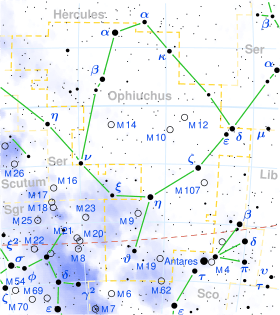Upsilon Ophiuchi
| Observation data Epoch J2000 Equinox J2000 | |
|---|---|
| Constellation | Ophiuchus |
| Right ascension | 16h 27m 48.18720s[1] |
| Declination | −8° 22′ 18.2245″[1] |
| Apparent magnitude (V) | 4.62[2] |
| Characteristics | |
| Spectral type | A3m[3] |
| U−B color index | +0.06[4] |
| B−V color index | +0.16[4] |
| Astrometry | |
| Radial velocity (Rv) | -30.60[5] km/s |
| Proper motion (μ) | RA: -67.49[1] mas/yr Dec.: -11.75[1] mas/yr |
| Parallax (π) | 24.42 ± 0.91[1] mas |
| Distance | 134 ± 5 ly (41 ± 2 pc) |
| Absolute magnitude (MV) | 1.75[2] |
| Details | |
| Mass | 1.94[6] M☉ |
| Radius | 1.9[6] R☉ |
| Luminosity | 16.56[2] L☉ |
| Surface gravity (log g) | 4.45[7] cgs |
| Temperature | 8,364[7] K |
| Metallicity [Fe/H] | +0.14[2] dex |
| Rotational velocity (v sin i) | 44[3] km/s |
| Other designations | |
| Database references | |
| SIMBAD | data |
Upsilon Ophiuchi (υ Oph) is a class A3[3] star in the constellation Ophiuchus. Its apparent magnitude is 4.62[2] and it is approximately 134 light years away based on parallax.[1]
The primary, Aa, is a spectroscopic binary with estimated period 27.2 days and eccentricity 0.74, and has a close companion Ab, of magnitude 8.83, in an 82.8 year orbit with eccentricity 0.45.[8][9]
References
- 1 2 3 4 5 6 Van Leeuwen, F. (2007). "Validation of the new Hipparcos reduction". Astronomy and Astrophysics. 474 (2): 653. arXiv:0708.1752
 . Bibcode:2007A&A...474..653V. doi:10.1051/0004-6361:20078357. Vizier catalog entry
. Bibcode:2007A&A...474..653V. doi:10.1051/0004-6361:20078357. Vizier catalog entry - 1 2 3 4 5 Anderson, E.; Francis, Ch. (2012). "XHIP: An extended hipparcos compilation". Astronomy Letters. 38 (5): 331. arXiv:1108.4971
 . Bibcode:2012AstL...38..331A. doi:10.1134/S1063773712050015. Vizier catalog entry
. Bibcode:2012AstL...38..331A. doi:10.1134/S1063773712050015. Vizier catalog entry - 1 2 3 Hoffleit, D.; Warren, W. H. (1995). "VizieR Online Data Catalog: Bright Star Catalogue, 5th Revised Ed. (Hoffleit+, 1991)". VizieR On-line Data Catalog: V/50. Originally published in: 1964BS....C......0H. 5050. Bibcode:1995yCat.5050....0H.
- 1 2 Mallama, A. (2014). "Sloan Magnitudes for the Brightest Stars". The Journal of the American Association of Variable Star Observers. 42: 443. Bibcode:2014JAVSO..42..443M.Vizier catalog entry
- ↑ Wilson, R. E. (1953). General Catalogue of Stellar Radial Velocities. Carnegie Institution for Science. Bibcode:1953GCRV..C......0W. LCCN 54001336.
- 1 2 Allende Prieto, C.; Lambert, D. L. (1999). "Fundamental parameters of nearby stars from the comparison with evolutionary calculations: Masses, radii and effective temperatures". Astronomy and Astrophysics. 352: 555. arXiv:astro-ph/9911002
 . Bibcode:1999A&A...352..555A. Vizier catalog entry
. Bibcode:1999A&A...352..555A. Vizier catalog entry - 1 2 David, Trevor J.; Hillenbrand, Lynne A. (2015). "The Ages of Early-Type Stars: Strömgren Photometric Methods Calibrated, Validated, Tested, and Applied to Hosts and Prospective Hosts of Directly Imaged Exoplanets". The Astrophysical Journal. 804 (2): 146. arXiv:1501.03154
 . Bibcode:2015ApJ...804..146D. doi:10.1088/0004-637X/804/2/146. Vizier catalog entry
. Bibcode:2015ApJ...804..146D. doi:10.1088/0004-637X/804/2/146. Vizier catalog entry - ↑ Malkov, O. Yu.; Tamazian, V. S.; Docobo, J. A.; Chulkov, D. A. (2012). "Dynamical masses of a selected sample of orbital binaries". Astronomy & Astrophysics. 546: A69. Bibcode:2012A&A...546A..69M. doi:10.1051/0004-6361/201219774. Vizier catalog entry
- ↑ Eggleton, P. P.; Tokovinin, A. A. (2008). "A catalogue of multiplicity among bright stellar systems". Monthly Notices of the Royal Astronomical Society. 389 (2): 869. arXiv:0806.2878
 . Bibcode:2008MNRAS.389..869E. doi:10.1111/j.1365-2966.2008.13596.x. Vizier catalog entry
. Bibcode:2008MNRAS.389..869E. doi:10.1111/j.1365-2966.2008.13596.x. Vizier catalog entry
This article is issued from Wikipedia - version of the 12/2/2016. The text is available under the Creative Commons Attribution/Share Alike but additional terms may apply for the media files.
